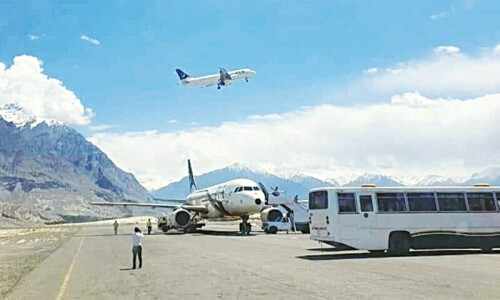
THE vaunted ‘establishment’, it would appear, is getting rather anxious. Over the past week whatever little pretence there remained about the autonomy of Pakistan’s mainstream politicians was put to bed in three almost simultaneous announcements. First came Musharraf’s (laughable) 20-odd party alliance, followed by the MQM-PSP farce in Karachi and finally the revival of the MMA.
The open secret of behind-the-scenes machinations of the permanent state apparatus makes clear that for all that has changed in Pakistan, much remains the same. It took 23 years for the establishment to even permit direct elections in this country, and historians have shown that even in 1970 the Yahya Khan regime did its utmost to manufacture the outcome. Since then, the actors and methods may have changed, but the instincts of the men in khaki have never wavered.
If the establishment is concerned with little else than asserting its exclusive right to rule this country, those on the civilian side clearly don’t possess the leadership and foresight to challenge status quo. It is simply not enough to cry foul at ‘hidden hands’ and make politics only about wresting power from these hidden hands. What vision do we have for the future? And how can we put it into practice?
Recently I came across a photo of more than 20,000 youth converging at Jamshoro for admission to Sindh University. Only a small fraction will be enrolled, the rest turned away to ruminate on a bleak future. It is repeated often enough for it to now be common knowledge: more than 60 per cent of Pakistan’s 200 million people are below 25 years of age. In principle, youth bulges can signal golden periods for societies, especially if young people are equipped and motivated to contribute to their own development and that of society.
Our youth bulge is a social crisis unlike anything we’ve seen.
As of now, Pakistan’s youth bulge seems like a volcanic eruption waiting to happen. Ours is an education system that leaves young people ill prepared to cope with the challenges of the 21st century. The majority of our educated youth do not have the cognitive tools to understand the vast global changes taking place, let alone think about ways to engage with these changes creatively so as to build sustainable, equitable societies.
In any case, we still have over 20m children out of school. Amongst those who do go to school many do not continue beyond the secondary level. Addressing this crisis is not simply about playing a numbers game in donor-funded conferences. It requires deeper thinking about class and other social structures that reinforce inequality over generations — and a commitment to policy steps that challenge class privilege.
Both those who go to school (even university) and those who don’t share one thing: they all have precarious employment prospects. The numbers are mind-boggling: at least 30m young people will enter the workforce in the next couple of decades. This does not include those not accounted for in formal statistics such as child labourers. A large number of both educated and uneducated young people seek employment outside Pakistan; many resort to illegal means and suffer untold misery in doing so. But the fact remains that there are not nearly enough opportunities, inside the county or outside, illegal or legal, for the number of young people out there.
This is the making of a social crisis unlike anything this country has seen if only because the scale of the problem is unprecedented. Given the sway of reactionary political ideologies here and around the world, there’s every chance that many young people will think that their growing alienation can only be explained by a politics of hate, bigotry and violence.
It is telling that columns and editorials have been printed on these pages recently commemorating the centenary of the Bolshevik Revolution yet there has been little discussion on how the egalitarian ideal symbolised by the creation of the Soviet Union can be resuscitated in our times. I believe it must be, that transformative politics that speaks to the tens of millions of young people for whom the current system offers little hope is the need of the hour.
What does this look like? Free education, restructuring of our curriculum, health and housing for all, a reclaiming of the commons – land, water and other natural resources — from the nexus of state and capital (and particularly the fetishism of consumption), the building of an ecological civilisation based on harmony between human needs and the environment, and personal freedoms irrespective of caste, creed, gender or religion.
Once upon a time, this was what they called socialism. More than any other segment of our society, today’s youth and the generations that follow will have to choose, as Rosa Luxemburg said a century ago, between socialism and barbarism.
The writer teaches at Quaid-i-Azam University, Islamabad.
Published in Dawn, November 17th, 2017












































